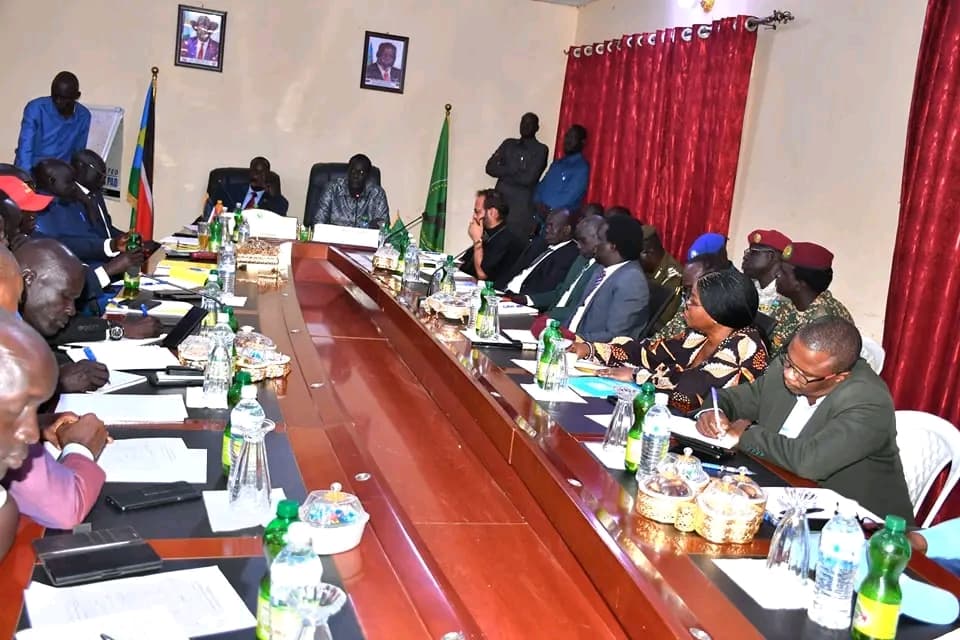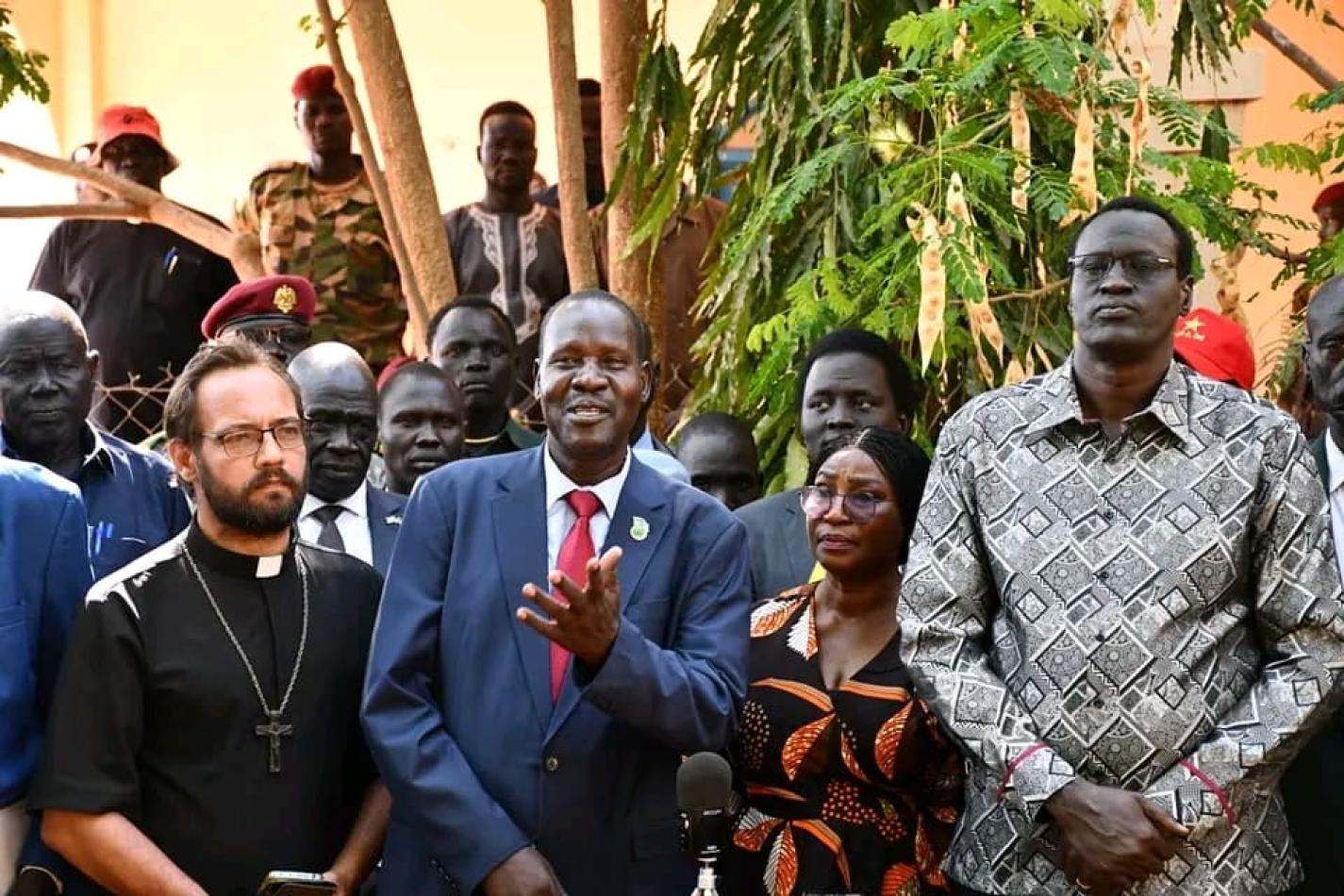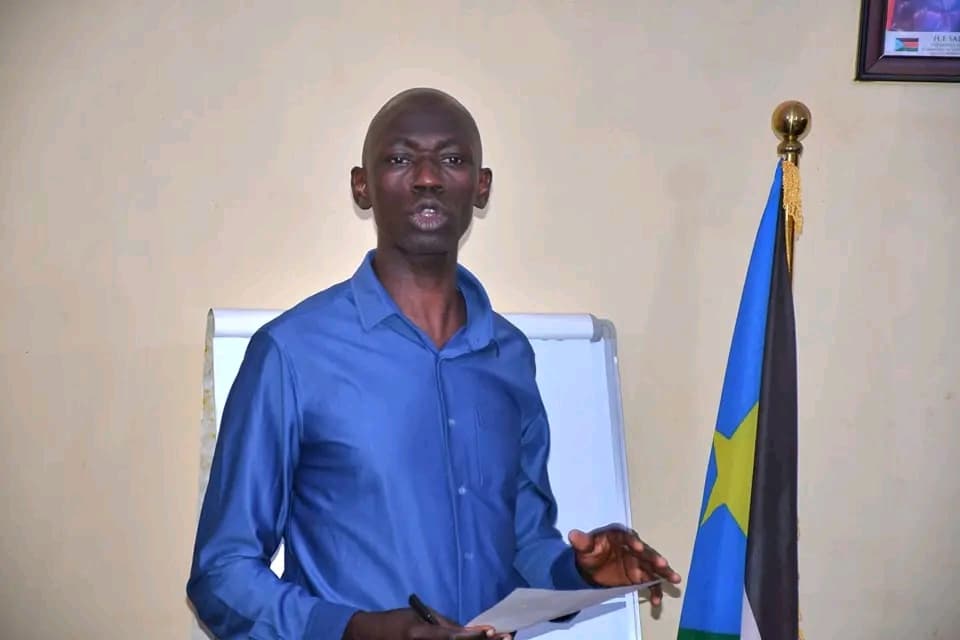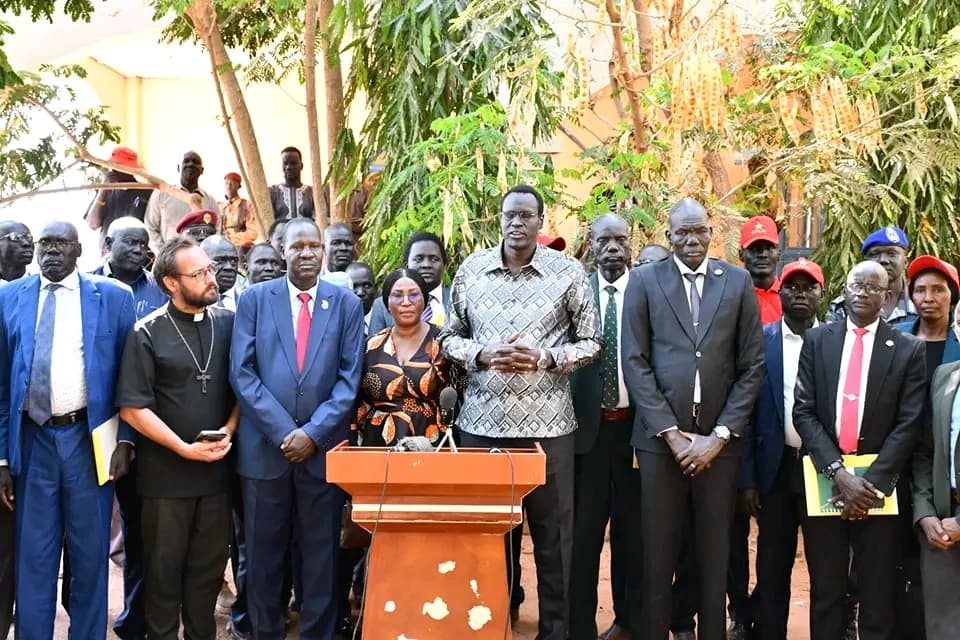Daniel Comboni
Comboni Missionaries
Institutional area
Other links
Newsletter
Thursday, February 6, 2025
Mgr. Christian Carlassare, Bishop of Bentiu in South Sudan, have just concluded two sessions of peaceful dialogue between the two communities of Dinka Ruweng and Nuer from Bentiu Diocese to overcome conflicts and past violence to see a common future and build a common space together. The conference was organized by UNMISS and facilitated by Mr. Edmund Yakani, representing South Sudanese civil society. It was a great occasion of encounter after so long with no relationships because of the past conflict and the deriving trauma. [See attachments]

PRAYER AND COMMENT ON PEACE AND SOCIAL COHESION
AT RUWENG AND BENTIU CONFERENCE PROMOTED BY UNMISS
By Bishop Christian Carlassare
January 31, 2025
Biblical Reading: Isaiah 2:1-5
“It will happen on the final days…” but what about in our time? Can we leave in peace? Can we change our way of life, give up with swords, spears and guns, and invest in building up our society rather than destroying it, and producing prosperity not only for few, but also for all people?
We often pray for peace, because it is a gift from God. Peace is the gift that Jesus gives to his disciples after his resurrection, as he stood among them and said to them: "Peace be with you" (Lk 24:36). God is always there to minister peace in every situation. In a very difficult moment, Jesus left his disciples with a gift: “I leave you with the gift of peace. My own peace I give you. And the peace I give you is a gift the world cannot give” (Jn 14:27). So, peace is God’s gift.
Nonetheless, peace demands human effort as well. In his life, Jesus repeatedly called for peace and reconciliation. In his preaching, he said:“Blessed are the peacemakers, for they will be called children of God” (Mt 5:9). This beatitude tells us that peace requires our commitment.
First, peace with God through a life lived according to his will.
Secondly, peace is an interior peace with oneself. Peace begins with me in my heart.
Thirdly, peace is an exterior peace with our neighbours and all of creation.
Indeed, peace is the supreme good to ask as a gift from God and, at the same time, peace is to be built with our every effort by respecting the dignity of every person, promoting dialogue, seeking justice, and defending the rights of the most vulnerable people. Social cohesion is not merely a product of chance, but requires active and conscious efforts by individuals, communities, and leaders to foster unity.
In an interview last December (2024), the Holy Father, Pope Francis, condemned the hypocrisy of talking about peace while preparing for conflict by embracing a propaganda that speaks of others like they were threats or enemies. He expressed concern for the weakening of institutions that allow groups profit from the arms trade. Most countries of our world overspend in military expenditure. If part of those expenses were directed to development, avoiding any conflict, famine could possibly end. Pope Francis explained that dialogue is crucial: “If there is no dialogue, there will be no peace. We must stop attacking one another, stop destroying one another, and start engaging one another”.
Peace and social cohesion are achieved through dialogue. Any form of violence is always a defeat. Conflicts are caused by a lack of mutual respect and the desire to impose particular interests at the expense of the common good. These tensions often come from those who seek to polarise people and control everything, imposing their vision even on matters that should instead be handled together while seeking the common good. If a decision brings an advantage to one community at the expense of another, it is not good at all. One community benefits when all communities are fine thriving. The nation can stand when all communities can live in dignity. We have to heal the division. Our communities have more in common than what we may be ready to acknowledge; more reasons to be in solidarity than to separate with the illusion that each group can stand alone by its own.
Often decisions are based on past experiences. Sometime experiences were negative, and so we decide to carry on these grievances. Forgiveness is an essential component of any positive progress in society. Jesus gave a new commandment: “Love one another. As I have loved you, so you must love one another” (Jn 13:34). “Love your enemy so that you may be children of your Father in heaven” (Mt 5:44). No one is an enemy: the person you call enemy is actually a brother and sister even though they might have done something wrong. Therefore, do not make yourself an enemy to anyone by calling them your enemy. Social cohesion can only be built upon this foundation of love. It requires the active choice to forgive, to show kindness, and to give peace a chance by journeying together along the path of fraternity. St. Paul echoes this sentiment in Ephesians 4:2-3: “Be humble and kind. Be patient. Bear with one another in love. Make every effort to keep unity through the bond of peace”. Let us not allow any negative talk or deed rob us of the peace that our communities need and deserve. Preserving unity and upholding peace is a process that demands effort, humility, and patience.
Leaders play a key role in society to pursue peace. In Proverbs 29:2, we read: “When the wicked are in power, the people groan. When the righteous rule, the people rejoice”. Leaders – who are righteous and just – help to build a society where peace can be achieved. Leaders must belong to the people, pay attention to their needs and demands, and understand their thoughts and mind. However, leaders must not be led by the popular will just to win consensus. Leaders have a great responsibility. They must lead people by forming their consciences and offering a new vision that peace is always possible; that only non-violent means can solve conflicts; and that only social solidarity can bring sustainable development and real prosperity.
In conclusion, I take the chance to present to you the prayer of St Francis of Assisi that is also known as the Christian prayer for peace. It is beautiful not only reciting it this morning, but also meditating on it every day.
Lord, make me an instrument of your peace.
Where there is hatred, let me bring love.
Where there is offence, let me bring pardon.
Where there is DIVISION, let me bring UNITY.
Where there is error, let me bring truth.
Where there is doubt, let me bring faith.
Where there is despair, let me bring hope.
Where there is darkness, let me bring your light.
Where there is sadness, let me bring joy.
O Lord, grant that I may not so much seek
to be consoled as to console,
to be understood as to understand,
to be loved as to love,
for it is in giving that one receives,
it is in self-forgetting that one finds,
it is in forgiving that one is forgiven,
it is in dying that one awakens to eternal life.
PRAYER AND COMMENT ON DIALOGUE AND RECONCILIATION
AT BENTIU AND RUWENG CONFERENCE PROMOTED BY UNMISS
By Bishop Christian Carlassare
February 5, 2025
Gospel Reading: Mt 22:12-18.21-35
We like to hear that God is the Good Shepherd, who sets out to seek the lost sheep. We also like our animals and we think they are blameless. We forget that the lost sheep is not so innocent. She got lost because she broke the rules of the flock, maybe not only once, but numerous times. Other shepherds would be fed-up with her and would abandon her to her fate, but the Good Shepherd does not lose hope. He does not give up, but goes to search for the stray people in order to bring them back to his sheepfold. “I want mercy and not sacrifice. Indeed, I came to call not the upright, but sinners” (Mt 9:13).
I think we can also understand ourselves like lost sheep. Along our history, every time we went back to conflict, we lost the way. And God came down to look for us and found us in a miserable condition. He raised us and carried us on his shoulders back home. This is a shared condition for all our communities in South Sudan. No one can deny any wrongdoing. At the same time all communities have the perception of having being – sometime in history – a victim of injustice and violence. My question is: how do we allow the Good Shepherd to load us on his shoulders and carry us back home to share the same sheepfold with other sheep?
Jesus, in the Gospel, answers this question: “Forgive, not seven, but seventy-seven times” or better still seventy times seven which it makes four hundred ninety. Jesus means, forgive always: 490 times a day. Let forgiveness be so regular that it is like your breath. As our breath is our very life – because when there is no breath there is no life - may forgiveness become your way of life. You have been forgiven, so forgive. Breath in, breath out.
In South Sudan, we often misinterpret the meaning of forgiveness. Archbishop Desmond Tutu of South Africa used to teach that “Forgiving is not forgetting. It’s actually remembering”. Remembering helps to avoid that evil may occur again. In fact, the Gospel speaks also of fraternal correction together with forgiveness. Forgiveness does not mean that we become friends with evil. We still denounce it. At the same time, forgiveness is the decision to give up your justified right to hit back. When you forgive, you offer the chance for a new beginning and write a new chapter of history. So, you don’t actually forgive because your enemy deserve your forgiveness, but because you deserve peace, your children deserve peace, and our world deserves peace.
Therefore:
Forgiveness is a gift that can be given to others, but it is also a gift that can be given to oneself.
Forgiveness is a choice that can be made to move forward in life and break the cycle of pain.
Forgiveness is a sign of strength that can help people take back control of their lives.
Forgiveness is a way to heal oneself and the world, and to free oneself from the past.
Forgiveness is a way to move forward in life and be free from the mistakes of the past.
Former president of South Africa, Nelson Mandela, was another outstanding witness. As a victim of the apartheid system, he spent many years in prison because of his violent struggle. As he reconciled with the history of his nation and forgave those who had wronged him, he contributed so much to the building of a united nation that would embrace differences rather than rejecting them. He wrote: “As I walked out the door toward the gate that would lead to my freedom, I knew if I didn’t leave my bitterness and hatred behind, I would still be in prison for the rest of my life”. There is no freedom without forgiveness; no way to justice and prosperity.
Our communities may find forgiveness very difficult, given the painful memories and losses sustained in the past years. Each community tends to remember negative events more than positive ones. People are taken up by a turmoil of emotions when they identify their own community as the victim, and try to seek justice by their own means. However, if South Sudan is to have any hope of peace, our communities must find the courage to forgive, not just the individuals who have wronged them, but also the larger system that has perpetuated division and violence.
I draw also from my personal experience. After the attack where I got shot and wounded with four bullets, forgiveness freed me from anger, frustration and, most of all, fear. It was because of forgiveness that I could go back to Rumbek. Against any generalisation, I acknowledged that the community was innocent. The evil deed was done by a group of individuals. I was not the only victim. The very same community was also a victim of that single act of violence, and any other form of violence that is perpetuated in our society. The community should not be punished any further. We have to overcome any form of stigmatisation of a group because of their name or their reputation. Each person should be judged for his character and should be respected in his dignity.
In conclusion, dialogue and reconciliation are about creating a new narrative for South Sudan – one where our different communities, instead of seeing each other as enemies, recognise each other as fellow South Sudanese. Mandela’s vision of reconciliation emphasises the need for a shared future: “Reconciliation is not just about forgiving; it’s about building something together, a shared future, a common ground”. Therefore, the dialogue in South Sudan must focus not just on the past but on building a future where all groups can live in harmony. The process of reconciliation, though long and difficult, offers a chance to move forward together, side by side, with dignity and respect, respecting the identity of each group and at the same time building up a common belonging to the same nation.
PEACE WILL COME by Charles de Foucauld
If you believe that shaking hands is stronger than a gun
If you believe that the things that unite men are more important than those that divide them.
If you believe that being different is a richness, not a danger
If you can choose between hope or fear,
If you believe that it’s you that has to take the first step, not the other …
Then peace will come
If the sight of a child still melts your heart
If you can rejoice from the joy of your neighbour
If injustices to others upset you like an injustice to you,
If for you a stranger you meet is a brother
If you share your bread and can add a piece of your heart to it …
Then peace will come
If you believe that forgiveness has more value than revenge
If you can sing the joy of others, and share their happiness
If you can welcome the poor who is wasting your time, and look at him with sweetness,
If you can welcome and accept a different way of doing things than yours,
If you believe that peace is possible,
Then peace will come
PRAYER FOR PEACE IN SOUTH SUDAN
God the Father of love and mercy,
you created our people from every clan, tribe and nationality.
It is your will that all our people should live in harmony, peace and unity,
because we are all brothers and sisters.
We ask forgiveness for the times we failed to live together in peace.
Heal our offences and help us to reconcile with one another.
Grant to our leaders your divine wisdom
and help us all to promote respect, justice and true reconciliation,
so that the people of South Sudan may live in unity and peace.
We ask this through Jesus Christ our Lord. Amen.
Bishop Carlassare Christian






